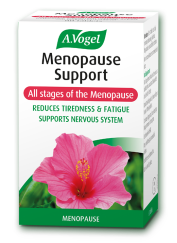Today's topic
Today on A.Vogel Talks Menopause I'm going to be talking about the question, "Can menopause symptoms come and go?"
Can menopause symptoms come and go?
So, can menopause symptoms come, disappear, and then come back again? Yes, they certainly can.
It's really unfortunate because this can give you a false sense of security. You might find that your symptoms start to ease off and you think, "Oh, thank goodness. It's coming towards the end. I'm feeling a lot better. My symptoms are not disrupting my life so much." And then, suddenly, one or two or even three of them come back with a vengeance.
You can also find that you have good and bad days, so it can be really short-lived. You might find that you get one or two good days and, again, you're thinking, "Oh, I'm feeling so much better." And then, normally, just when the weekend comes, you wake up and just think, "Oh no, the fatigue is back. The aches and pains are back."
So, this is a scenario in the menopause that's extremely common, and most women do tend to experience this at some point or other.
What symptoms can sometimes stop and start during menopause?
It tends to be the main ones, so these would be things like your hot flushes and your night sweats.
It can also be periods. This is a really common one – a lot of women think that once their periods stop and they miss one month, then that is it.
Now, periods can come and go for sometimes two to three years, and I've known women who have had one period a year for two or three years before they've completely disappeared. A lot of women find that they might miss one or two periods, then they come back again for a couple of months, then maybe they miss three periods, and then they get three periods.
So, as I've said, this can go on for quite a while before you suddenly realise that you haven't had any periods for quite a long time.

Are you Menopausal? Need help with your symptoms? Try our Menopause Symptom Checker.
Answer 3 question to find out if you could be menopausal and get personalised tips and advice straight to your inbox based on your results.
More symptoms that can sometimes stop and start during menopause
Sleep is one of these ones that can be really affected one way or another. And the problem with sleep is that it's not just the fact that the hormonal changes may be interfering with your sleep, but the fact that we have day-to-day stress.
If we're extra busy, if we're extra worried, then that can affect our sleep, too. And, again, a lot of women find that those periods when they're extra stressed, when they're run down, or they're extra busy, these are the times that they need the best sleep. But this is a time when they actually get the worst sleep! So sleep, probably along with the hot flushes and sweats, is probably the most common symptom that tends to come and go.
You have also got mood and anxiety. And, again, a lot of it is to do with the hormones falling but it can be due to day-to-day life as well. If we've got extra things to worry about, if we're extra fatigued, then that will affect our mood as well. So a lot of these are intertwined with each other. They don't just happen in isolation.
The other main symptom that a lot of women find that eases off and gets worse is joint aches and muscle aches and pains. Again, this can be due to a lot of different factors all combining together. And, if you think about it, if you have a poor night's sleep, that is going to interfere with your pain perception, which will make you feel more achy the following day. So, again, these tend to be all linked together.
What can cause these symptoms to come and go or get worse?

Your hormones
The number one thing is the hormonal flux. We tend to think that in the menopause our hormones are going to fall nice and gently, and in harmony with each other, and they very often don't do that.
Your body likes equilibrium. And, if your hormones start to fall, it will do all it can to try and level them out. So, you might get a sudden dip in your hormones. The body then tries extra hard so it's using more energy to try and balance things out. That can then cause fatigue and all sorts of other symptoms.
So, this movement of your hormones going up and down can be a big factor. Usually, when you feel better, that means that your oestrogen has taken a bit of a rise and, when you feel worse, it's when your oestrogen has dipped.
If symptoms suddenly appear terribly worse than what they've been before, then very often that's an indication that your oestrogen at that point has basically gone into free fall.
Stopping taking your supplements or herbs
A lot of women don't like taking things on a daily basis, so if they start a regime of supplements or taking herbs for specific symptoms, once they feel better, they're going to go, "Oh, that's it. I can stop taking them."
The problem here is that our bodies need a lot more support during the menopause because of all the physical changes that are going on.
So, if you find that supplements and herbs are helping you, very often these are more long-term solutions. So maybe every six months, review how you feel. If you think you can do without certain things, then just try cutting down maybe for a few weeks and see exactly how you get on.
Your diet
As I just mentioned, your nutritional needs go up in the menopause. Your body needs more of everything. And if for some reason your diet gets worse then, again, that can make your symptoms worse.
One of the interesting things we do find is that very often during the party season, symptoms tend to get worse straight afterward because you've been drinking more, and you've been eating more. This can happen after holidays as well, especially if you go on these all-inclusive holidays where you're eating and drinking a lot more than you would do normally.
Then a lot of women find that, once they get back from holiday, instead of feeling relaxed and chilled, their symptoms come back with a vengeance. And a lot of it is just due to the fact that we're not eating enough of the good things that our body really craves at this particular time.
Dehydration
Number four is dehydration, and this is such a common one. Again, in the wintertime, a lot of women find that their symptoms get worse, and it's purely because, who likes drinking water in the cold weather?
Most of us would prefer a cup of tea or something nice and warming. And, especially for those of us here in the UK, we're living in centrally heated houses the whole time, which is going to dehydrate us even further.
So, really look at this one if you find that your symptoms come back because very often dehydration is right at the heart of it.
Stress
And number five is stress. Stress lowers our resilience to everything. Stress will put extra stress on our body, and that will have a direct effect on how well our nervous system can cope with the symptoms that we're experiencing. So, as you can see, there's quite a lot of different factors to this.
One of the things I do recommend, if you find your symptoms have come back, is to just sit down and think about what was going on in your life when those symptoms suddenly appeared. Have you been more stressed? Have you been running round like an idiot and not looking after yourself? Have you not been quite so good with your diet? Have you been missing out the water?
Very often, you will get a clue, and once you know what's going on then it's much more easy to fix because you can just start drinking more water, having a little bit more rest and relaxation, or eating just that little bit better.
So, I hope you found this an interesting one. If any of you have any questions on this, then please do get in touch.
Vote
We recently ran a poll to find out which symptoms are most likely to come and go during menopause. We've crunched the numbers and here are the results.
Results: Which of these symptoms do you find comes and goes MOST for you?
Not only are they some of the most common menopause symptoms, according to last week's survey, hot flushes and night sweats are also the most likely to come and go, with 39.2% saying that these symptoms are the ones that stop and start most for them.






